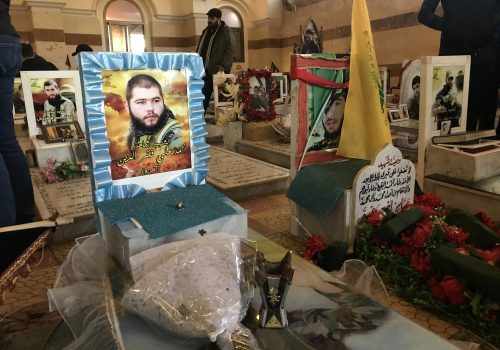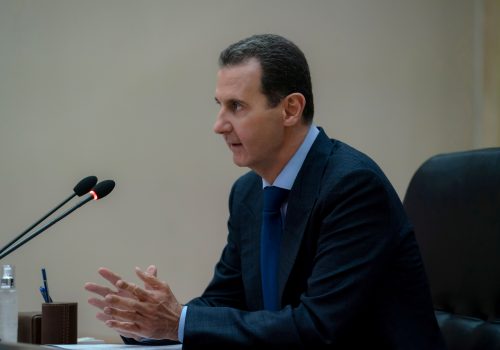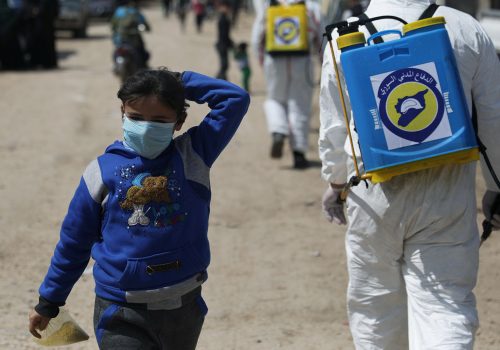The Syrian parliamentary elections were a mockery
In Baathist Syria, the system for parliamentary elections used to be simple. As far as I remember, 70 percent of the seats were officially reserved for the Baath party and their allies in the National Front. According to Article 8 of the 1973 Constitution, the Baath was the “leading party in the society and the State.” The remaining 30 percent of seats were supposedly divided between “independent candidates.”
Towards the end of Hafez al-Assad’s rule, some degree of symbolic “pluralism” among independent candidates took form. During at least one of his terms in office, one or two Islamists were seated in the People Council alongside Kurds or tribal leaders. This ended completely under Hafez’s successor, Bashar. With the arrival of the young president, the secret services—the notorious Mukhabarat—were more heavily involved than ever in the designation of so-called independent candidates. Their seats would preferably be offered to businessmen or to others close to the regime as a sort of reward.
It goes without saying that the People’s Council had no real power except for being a rubber stamp for decisions taken by the Executive Branch. Its only great role was—and still is—to endorse the president of the Republic and submit his name to the referendum. This was the case for Bashar himself, first in 2000 and then for each of his re-elections.
But Syrians are not supposed to live in a Baathist Syria anymore: Article 8 was technically removed in the constitutional reform of 2012. But leading up to the so-called parliamentary elections that Syria just witnessed on July 19, there were speculations that an astute Assad could be giving a chance to an alternative party to the Baath—namely, the Syria Social Nationalist Party (SSNP). Considered to be the second most influential party in Syria, the SSNP is equally pro-regime, but with a more nationalist agenda and less baggage than the Baath.
In a way, the main lesson of the July 19 election was the extent to which it was business as usual for Damascus, despite the incredibly unstable context of almost a decade of war, no more than six million potential voters left in the regime-controlled areas, huge insecurity, economic depression, and an absent COVID-19 response with rapidly increasing infections.
At the end of the day, 70 percent of the seats went to the Baath party and its allies, as if Article 8 were still in place. Constitutional “reform” had no practical consequence—the elections were completely rigged as usual. However, they still gave an indication of the evolution of the social base of the regime. Inside the Baath party itself, a selection process was organized to eliminate the few former members of parliament who had dared express disagreement with Assad’s line. Among them, were a representative from Quneitra, some members of parliament from Sweida, and the prominent Syrian businessman from Aleppo, Fares Al Shehabi. The last Kurdish member of the assembly as well as an Armenian candidate were also eliminated. Outside the Baath, there are a series of independent newcomers who are trying to enter politics. Some of them are heads of government-affiliated militias, pointing to the rise of civil war profiteers. This is the case with the leaders of the National Defense Forces in Hama—both in the city and the countryside—and of new businessmen, including the most prominent of them, Hussam Qaterji (although in the case of the Qaterji brothers, it’s difficult to tell whether they are warlords or businessmen).
Does the “business as usual” mood around the July 19 elections mean that the ballot had no stakes for the regime or its opponents? Actually, no. The regime needed to show its ability to assure the continuity of formal public life and the regularity of institutions. It took great efforts from the government and the security agencies to mobilize minimum turnout—officially 33 percent, as opposed to 58 percent in 2016—and to set up polling stations in the newly recovered areas in Ghouta and even in Idlib province. Many polling stations were also set up in garrisons to allow soldiers to participate, as voting is now authorized—if not mandatory—for the rank and file of the law enforcement agencies and the military.
All in all, the result was not great for the Assad regime, but the veneer of a normal election was achieved, especially given that the low turnout could be excused by the pandemic.
A second stake for Assad was to make sure that the next People’s Council would be completely under its authority. In that respect, the parliamentary elections were a total success for the power in Damascus. There will be two potential practical implications of the election result. The first is that the regime will be able to rely entirely on this assembly to block any amendment to the 2012 Constitution, should the UN-sponsored constitutional committee agree—presumably under Russian pressure—on a substantive change in the institutions. Second, this assembly will not accept anyone other than Assad as the presidential candidate to be submitted by parliament for the popular vote next year.
In a way, these parliamentary elections herald the outcome of the 2021 presidential elections. What the regime is planning for the presidential referendum is part of the business as usual mantra: the same total control of the electoral process by the security agencies and the Baath party, the same lack of freedom of expression or debate, and of course, the same exclusion of Syrians from the diaspora.
The consequences of the 2021 presidential elections will be much more dire than the non-event of July 19 this year. In the eyes of many countries, once “re-elected,” Assad will have regained a cachet of “legitimacy.” At the very least, a number of countries will find it convenient to pretend so. Europe and the United States should declare, as of now, that there will be no normalization with an Assad regime that continues to ignore any notion of rule of law and all criteria that define credible elections. That should be the international community’s great takeaway from Syria’s mockery of a parliamentary elections.
Ambassador Michel Duclos a nonresident senior fellow at the Atlantic Council’s Rafik Hariri Center for the Middle East and a senior advisor to the Institut Montaigne. He is author of La Longue Nuit Syrienne (l’Observatoire 2019). Follow him on Twitter: @MrjDuclos.
Image: Women walk near banners for parliamentary election candidates in Douma, in the eastern suburbs of Damascus, Syria July 19, 2020. REUTERS/Omar Sanadiki


